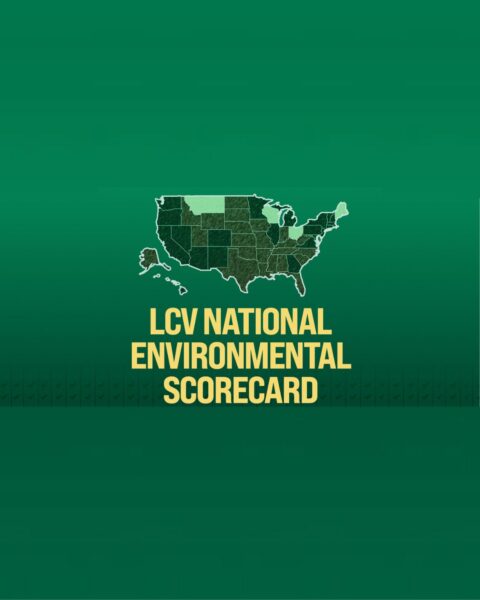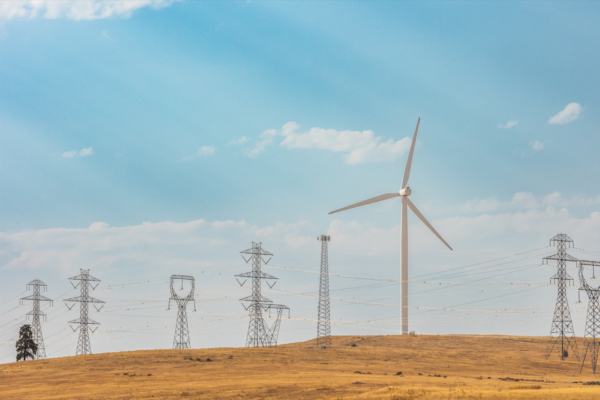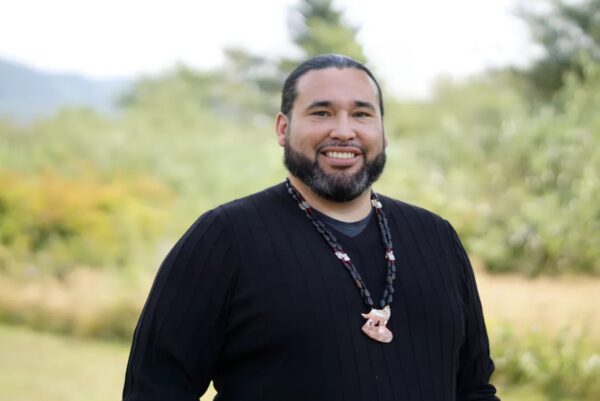Double Haul Timber Sale & Merril Lake Natural Resources Area Landslide
Pre-sale: Sale Preparation and Public Engagement
The Double Haul timber sale encompassed 248.1 acres on federally-granted trust lands in Cowlitz County. The sale was situated on steep slopes directly uphill of the Merrill Lake Natural Resources Conservation Area (NRCA). The Merrill Lake NRCA features some of the last old growth forest in Southwest Washington, and is used for recreation including flyfishing, hiking, and camping.
Double Haul contained areas of known geologic hazard, which were identified in the geotechnical report conducted by DNR staff licensed geologist. A landslide occurred in 1996 following harvest on private lands immediately upslope of the Double Haul parcel. Both DNR staff and members of the public raised concerns about logging on this land causing a landslide through email, SEPA comments, and public comment before the Board of Natural Resources (BNR). Organizations that commented included Cascade Forest Conservancy, Washington Forest Law Center, Clark Skamania Flyfishers, and Washington Conservation Action.
The geologic report and DNR emails make it clear, as well as internal DNR emails, that DNR staff were aware of the unstable slopes and the risk of damage to the NRCA as early as 2020. DNR staff in the Natural Areas Program were concerned about the risk and urged significant changes to the sale layout. DNR did make minor changes, including expanding the buffer around the unstable slope and suggesting additional fill to reinforce the road, but ultimately approved the timber sale with logging in the units with slope instability (units 5 and 6).
Internal DNR email exchanges make clear the pressure staff felt to maximize timber volume to the extent possible:
“We have mitigated for all of [the slope stability] concerns and feel we have gone well above and beyond what is needed to address ecological and aesthetic concerns – to the point where we are toeing the line between sound professional Forestry and dereliction of our fiduciary responsibility to the trust beneficiaries and the trust mandate.”
Post-Sale & Harvest Impacts
The Double Haul sale was harvested in the fall of 2023. Two landslides occurred in the area identified as unstable (Unit 5): first on November 8th, 2023 after normal precipitation, and again on December 13th, 2023 after an atmospheric river event.
Debris from the slides traveled over 1,000 feet downslope, washing out the forest road and causing significant damage to the Merrill Lake campground along the lakeshore. Sediment and debris from the slides directly impacted fish-bearing streams, blew out two culverts, and indirectly impacted the lake itself.
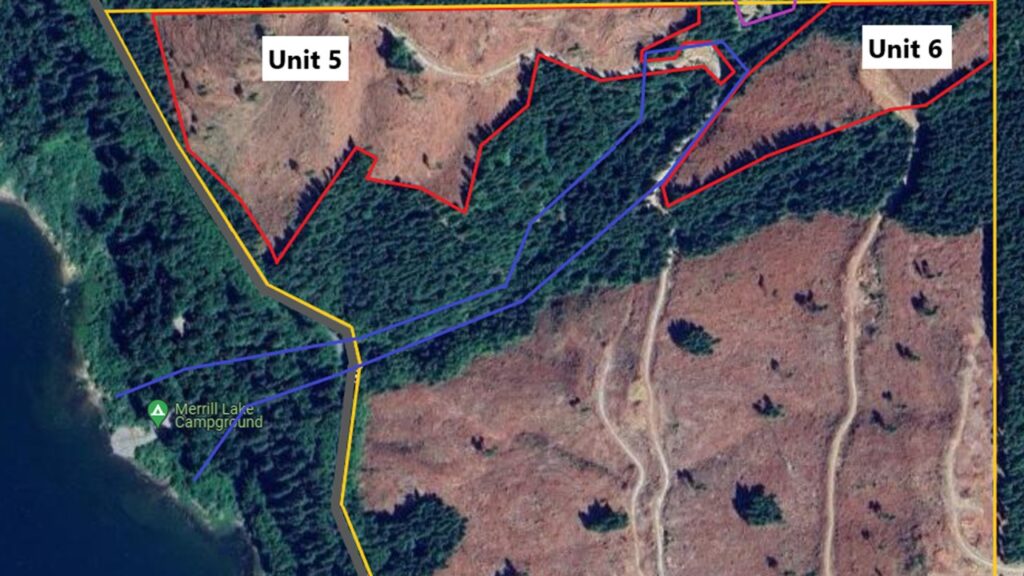
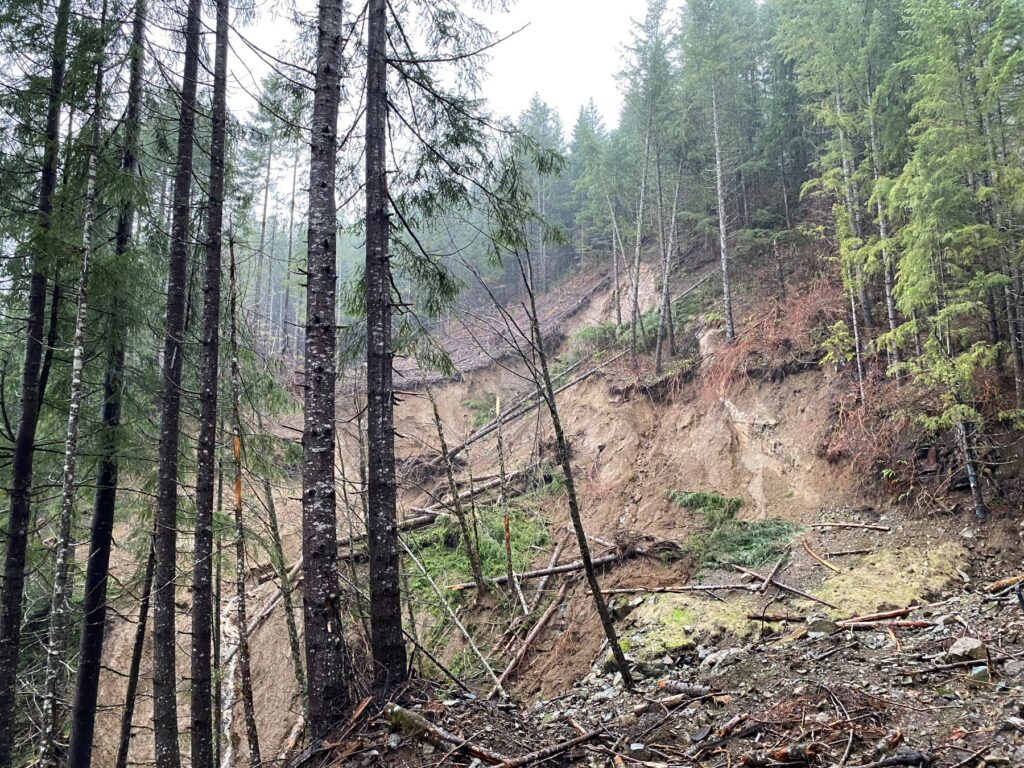
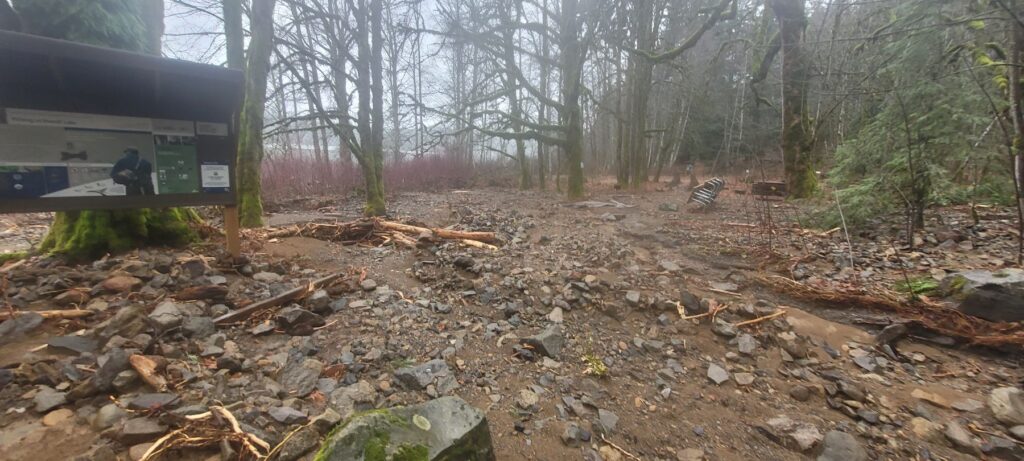
Implications
Logging Known Unstable Slopes was Harmful to the Trust. The unstable slopes in Units 5 & 6 contained only 29 of the 248 acres harvested in the sale. Based on the price per acre, we estimate the sale of Unit 5 generated approximately $200,000 in revenue. Approximately 2,527 feet of road (~40-50% slope) and one temporary culvert (18” x 40’) were built exclusively to provide access to Unit 5. The landslide post-sale caused unknown monetary damages to the permanent Nation Forest Road (pictured in grey above), two permanent culverts, the developed campsite, and the fish bearing stream. Collectively, these construction costs, plus costs for repairs to permanent infrastructure and restoration of the fish bearing stream will almost certainly exceed the revenue generated from harvesting that unit.
Proceeding with harvest of these acres was therefore economically harmful to the trust. This timber sale was part of the Federally Granted Trusts and State Forest Purchase Sustainable Harvest Unit (SHU). As of January 2023, this unit was at 100% of its targeted harvest for the 2015-2024 planning decade (1.9 MBF). Although it is unclear where the targeted harvest stood at the time of the Double Haul harvest, erring on the side of caution and removing the 29 acres on unstable slopes would not have caused the SHU to miss its target for the planning decade.
Incongruous with Trust Mandate. The State Supreme Court’s Conservation Northwest v. Franz decision affirms DNR’s duty to balance obligations under state and federal law, benefit to trust beneficiaries, and benefit to the public. Email exchanges retrieved via Public Disclosure Request (quoted above), make clear that DNR staff felt management options to mitigate hazards were constrained by their fiduciary responsibility to generate revenue for trust beneficiaries. CNW v. Franz decision makes clear that implementing the mandate affirmed by CNW v. Franz requires a change in the status quo and past interpretation of the trust mandate at DNR. The court’s ruling makes clear that electing not to harvest the relatively small amount of timber from the unstable slopes of Units 5 and 6 would have been well within DNR’s discretion to protect public values, ecological health, and the trust. With this clarification of authority and responsibility in mind, providing clear guidance and incentives from DNR leadership to the regions will be critical for shifting agency culture away from a historic focus on maximizing beneficiary revenue.
Operational Planning for the Sustainable Harvest Calculation. DNR could improve timber sale-level management decisions by shifting more operational planning to the SHU-level and allowing regions greater flexibility to adjust harvest plans based on the realities of each timber sale on the ground. Fixed decadal timber volumes, and the associated arrearage if that volume is not met, create unnecessary pressure on the regions to harvest even when not in the best long-term interest of the trust. This greater flexibility will be of paramount importance as DNR reacts to the impacts of climate change on forest health and management, and incorporates climate change into the SHC process. The expectation of more frequent atmospheric rivers (heavy precipitation events) directly impacts slope stability to a much greater degree than average precipitation in Washington.
Different Approaches and Risk Levels Across Regions. DNR management and threshold of risk acceptance vary across DNR regions based on the staff and culture in the region. A slope that would be deemed too risky to harvest in the Northwest Region might be harvested in the Pacific Cascade region, for example. While some regions appear to be taking a precautionary approach, some recent sales containing unstable slopes have been presented for BNR approval with less analysis or mitigation measures (such as Stilly Revisited which is still pending final approval). DNR can minimize the risk of ecological and economic impacts due to landslides by establishing adequate and consistent analysis of geologic hazards like unstable slopes across management regions, and establishing a norm of mitigation measures to address identified risk. Neither occurred in the Double Haul sale.
Utilizing Existing Alternatives. The Trust Land Transfer (TLT) program is a tool allowing DNR to identify economically underperforming trust lands that have high ecological value and replace them with more productive acres. The steep slopes above the Merrill Lake NRCA were a perfect candidate for TLT particularly given their adjacency to the NRCA. Although considered for TLT at one point, these lands were kept as General Ecological Management (GEM) lands managed for timber harvest. This was a missed opportunity to prevent the landslides.
Forest Practices Rules for Steep and Unstable Slopes. DNR appears to have conformed with forest practices requirements by conducting the requisite geologic assessment. This underscores the importance of changes to forest practices rules for steep and unstable slopes. This topic has been under consideration in the Adaptive Management Program since the Oso landslide in 2014, but not yielded any rule changes. In the absence of more robust forest practices rules, DNR has the discretion and duty to take a more precautionary approach in order to protect public resources and trust assets.
Your donation ensures a sustainable future.
